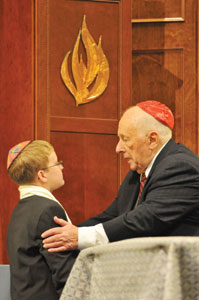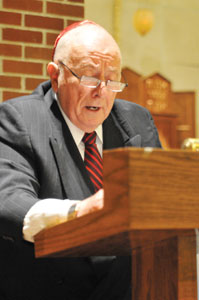 Cantor Paul Silbersher can give you several definitions of the word retire. Then he’ll tell you even though he’s officially retiring from Congregation Kol Ami as its spiritual leader, he probably won’t really retire at all. He’ll just take on another project.
Cantor Paul Silbersher can give you several definitions of the word retire. Then he’ll tell you even though he’s officially retiring from Congregation Kol Ami as its spiritual leader, he probably won’t really retire at all. He’ll just take on another project.
You see the 81-year-old Silbersher has already officially retired once, in 2000, as the cantor of The Temple, Congregation B’nai Jehudah. As cantor emeritus, he continued to work there part-time for the next three years.
Then in 2003 when Kol Ami was in its formative stages, he was asked to become the Reform congregation’s spiritual leader and has served in that capacity for the past eight years. While he uses the professional title of cantor, he is also a trained rabbi. He will be recognized as such following his retirement, said Kol Ami President Constance Bernstein, when he will begin using the title rabbi emeritus.
Bernstein said many congregants will miss Cantor Silbersher tremendously.
“He has such a magnificent voice,” she said. “His singing and cantorial skills are things we’ve grown to love and expect, and we will miss it sorely.”
Bernstein said the congregation is currently negotiating with a person to take over the spiritual leader duties at Kol Ami. She hopes the congregation will be able to make an official announcement in the near future.
Becoming a Jewish clergy
Cantor Silbersher’s career took a few twists and turns before he became a rabbi, or even a Jewish professional for that matter. At first he wanted to serve as a naval aviation cadet during the Korean War. He was accepted into the program, but the swearing-in ceremony was halted — because the program was suddenly full — just before he was about to be sworn. Instead he spent eight years in the Naval Reserve.
Next, in the late 1940s and early ‘50s, he worked as a page for the NBC television network. At that time network pages were often trained as young executives; the young man had hopes of becoming a director or a producer.
But things changed at NBC and pages were no longer being promoted. So he considered theater like his older brother. He did choose to be a performer, but on a congregational stage.
Although Cantor Silbersher was raised in a Conservative Jewish home by parents who kept kosher, he decided to enroll at the Hebrew Union College-Jewish Institute of Religion School of Sacred Music (which is now called the The Debbie Friedman School of Sacred Music). When he completed his cantorial studies, he decided he wanted to take on rabbinic training as well, so he enrolled in the pre-rabbinic program at HUC in Cincinnati.
As cantorial and rabbinical students often do, Cantor Silbersher served various congregations in Ohio, Connecticut and New York while he continued his studies. His rabbinical studies hit a few bumps in the road and he chose yet another path, earning a master’s degree in social work.
“I had a private therapy practice and at the same time I began to do interfaith weddings,” Cantor Silbersher explained. He also worked in several school situations as a social worker.
Eventually his rabbinical ordination was done privately by Rabbi Jack Bemporad and Rabbi Irving Baumol. At that point Cantor Silbersher took over the helm of a small congregation, The Fellowship for Jewish Learning in Stamford, Conn. When he came to Kansas City, he turned it over to Rabbi Mark Golub, who is now most well known as the president and CEO of Shalom TV.
As a Jewish clergyman, he has performed many interfaith weddings over the years, but said he discontinued that practice during the Vietnam War.
“I wasn’t willing to perform them then because I felt the couples who were marrying out of the faith were using it as a vehicle for anger,” he explained.
Once the war was over and he felt young people weren’t angry any more, he resumed performing interfaith marriages.
“I’m always open to the serious folks,” he said of his practice to marry interfaith couples, which he continues today.
Settling in Kansas City He came to B’nai Jehudah in 1979.
He came to B’nai Jehudah in 1979.
“It was the largest congregation I ever served. Before that the congregations I was at had 300 to 350 families,” he said of B’nai Jehudah, which served as many as 1,900 families during his tenure there.
Cantor Silbersher was almost 50 years old when he arrived here and only two of his four children were still living at home.
He was no longer the cantor at B’nai Jehudah when Kol Ami came calling, but he was still working part-time there as well as serving as director of spiritual care at Village Shalom. The idea of joining a new congregation and getting it started from the ground up was something that greatly appealed to him.
“I loved the idea of being creative and the inclusiveness of new ideas,” he said.
He loves teaching and will continue to write his thoughts about Torah on a regular basis through The Chronicle. He has many wonderful memories of teaching Bar and Bat Mitzvah students, often conducting phone lessons before school started at 6 in the morning — recalled by many as Sunrise Semester — so the kids could get extra practice.
He has former students, now adults, who also fondly remember the time they spent studying and worshipping in the Mayerberg Chapel when The Temple was at 69th and Holmes.
“We used to call the kids who were missing from B’nai Mitzvah class, tell them we hoped they were well and OK, and wish them a Shabbat Shalom. They told me it made them feel good,” Cantor Silbersher said.
“These were lifetime connections we made,” he continued. “I got to know them during their formative years.”
Kol Ami’s Bernstein said Cantor Silbersher “does wonderful Bar Mtizvahs.”
“All of our Bar Mitzvah students have just excelled and learned a great deal from him,” she said.
While he has no plans to tutor any more students, he may continue taking part in other lifecycle events — whether they be happy occasions or sad ones.
“I will be open to discussing possible opportunities with the board and the new spiritual leader,” he said.
Bernstein said there is a possibility that Cantor Silbersher may indeed continue in some role with Kol Ami, possibly teaching a Torah study class.
But actual retirement is not likely. Yes, he plans to have more time to play tennis, a sport he has always loved. He’ll also try to get himself back into shape by walking and spending time at the Jewish Community Center’s sports facility.
But the better bet is that he will spend a considerable amount of time at Hope Academy Charter School in Kansas City, Mo. He is a founder and a vice president of the school, located at Zion Grove Missionary Baptist Church at 2803 Swope Parkway. The school serves students ages 16 to 21 who have chosen to return to school after dropping out. It is sponsored by the University of Missouri-Kansas City.
“Education is where it all begins. If you can’t read and write, you don’t have a chance,” Cantor Silbersher said.
The school has held three graduation ceremonies and, he said, everybody there has something to cheer about.
“It’s something to experience,” said Cantor Silbersher, who plans to cheer along with them for years to come.
Retirement open house scheduled
Congregation Kol Ami will hold a reception in honor of Cantor Paul Silbersher’s retirement from 2 to 4 p.m. Saturday, June 11, at the congregation. The community is invited, but RSVPs are requested. Reservations should be sent to Carla Lieberman at or by calling (913) 499-8671 after 5:30 p.m.


